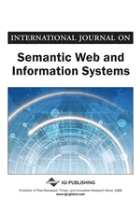
International Journal on Semantic Web and Information Systems
Scope & Guideline
Transforming Information Systems Through Rigorous Research.
Introduction
Aims and Scopes
- Semantic Web Technologies:
The journal emphasizes the development and application of semantic web technologies, including ontologies, linked data, and knowledge graphs, to facilitate better data interoperability and understanding. - Data Analysis and Mining Techniques:
Research published within the journal often explores advanced data analysis and mining techniques, utilizing machine learning, deep learning, and fuzzy logic to derive insights from complex datasets. - Application in Diverse Domains:
The journal covers a wide range of applications in various fields such as healthcare, cybersecurity, social networks, and environmental studies, showcasing how semantic web technologies can solve real-world problems. - Interdisciplinary Approaches:
The focus on interdisciplinary methodologies highlights the integration of computer science with fields like social science, healthcare, and environmental science, fostering collaboration across disciplines. - Innovative Frameworks and Models:
The journal publishes research on developing new frameworks and models, particularly those that leverage semantic technologies for enhanced system functionalities in areas like recommendation systems and decision-making.
Trending and Emerging
- Integration of AI and Semantic Technologies:
There is a growing trend towards integrating artificial intelligence with semantic web technologies, particularly in applications related to healthcare, cybersecurity, and automated decision-making. - Real-Time Data Processing and Analysis:
Research focusing on real-time data processing, especially in edge computing and IoT contexts, is becoming increasingly prominent, addressing the need for immediate insights and actions based on live data. - Cybersecurity Enhancements through Semantics:
The application of semantic web technologies to enhance cybersecurity measures, including threat intelligence and intrusion detection, is an emerging theme, driven by increasing security concerns. - Emotion and Sentiment Analysis:
The field is witnessing a rise in research dedicated to emotion and sentiment analysis using semantic techniques, particularly in social media and user-generated content, reflecting the importance of understanding human emotions in data. - Sustainability and Environmental Applications:
There is an increasing focus on the application of semantic web technologies to address sustainability challenges, such as environmental monitoring and resource management, showcasing the journal's commitment to addressing global issues.
Declining or Waning
- Traditional Semantic Web Applications:
There has been a noticeable decline in publications focusing on traditional semantic web applications, such as basic ontology development and semantic search, as newer, more complex applications gain prominence. - Static Data Models:
Research on static data models, which do not incorporate dynamic data processing or real-time analysis, appears to be waning as the field moves towards more adaptive and responsive systems. - Generalized Information Retrieval:
The exploration of generalized information retrieval methods has decreased, with researchers favoring specialized and context-aware retrieval techniques that leverage semantic understanding. - Low-Dimensional Data Processing:
There is a reduction in studies focusing on low-dimensional data processing techniques, as the emphasis shifts towards high-dimensional data and advanced computational methods to handle complexity. - Basic Machine Learning Applications:
The journal has seen a decline in simple machine learning applications that do not integrate semantic features, as the focus turns towards more sophisticated models that combine semantics with advanced learning techniques.
Similar Journals
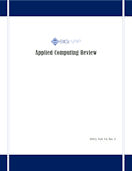
Applied Computing Review
Navigating the Intersection of Theory and ApplicationApplied Computing Review is a prominent academic journal published by the Association for Computing Machinery (ACM), an esteemed organization known for advancing the computing profession. Focusing on the intersection of practical applications and theoretical foundations, this journal serves as a vital platform for disseminating research in the field of applied computing, facilitating knowledge sharing among researchers, professionals, and students alike. With an ISSN of 1559-6915, the journal encompasses a wide array of topics including software engineering, data analytics, and application development, addressing current trends and challenges in the industry. Although it does not offer open access, its rigorous peer-review process ensures high-quality publications that significantly contribute to the discipline. Positioned within a competitive landscape, Applied Computing Review is dedicated to fostering innovation and providing insightful perspectives that inspire further research, thereby solidifying its importance in the field of applied computing.
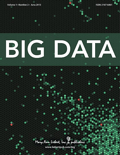
Big Data
Advancing knowledge in big data technologies.Big Data, an esteemed journal published by MARY ANN LIEBERT, INC, serves as a leading platform within the realms of computer science and information systems. Launched in 2013, this journal has made significant strides in shaping the discourse around the management, analysis, and applications of large-scale data. With a commendable impact factor reflected in its 2023 quartile rankings—Q1 in Information Systems and Management, and Q2 in both Computer Science Applications and Information Systems—Big Data is recognized for its quality and influence, holding a notable position in Scopus rankings. Renowned for its rigorous peer-review process, the journal welcomes original research, reviews, and discussions that address the challenges and innovations associated with big data technologies. Researchers, professionals, and students alike will find Big Data an indispensable resource that not only highlights emerging trends but also fosters collaboration and knowledge sharing within the data science community. Access options are available through institutional subscriptions and individual access, ensuring a broad dissemination of critical research findings.

Data Science and Engineering
Pioneering insights in artificial intelligence and beyond.Data Science and Engineering is a premier open access journal published by SPRINGERNATURE, dedicated to advancing the fields of data science, artificial intelligence, computational mechanics, and information systems. Since its inception in 2016, this journal has rapidly established itself as a leader in the academic community, boasting an impressive Q1 ranking in multiple computer science categories, including Artificial Intelligence, Software, and Information Systems. With a commitment to disseminating high-quality research, it caters to a diverse audience of researchers, professionals, and students eager to explore the intersection of data and technology. The journal's robust global reach, combined with its respected reputation, empowers authors to share their findings widely, facilitating breakthroughs and innovations across the digital landscape. Join the vibrant community of scholars contributing to this integral field of study, and stay informed with the latest research by accessing the journal freely online.
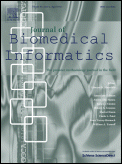
JOURNAL OF BIOMEDICAL INFORMATICS
Unlocking the potential of informatics in healthcare.JOURNAL OF BIOMEDICAL INFORMATICS, published by Academic Press Inc. Elsevier Science, is a premier peer-reviewed journal dedicated to the integration of computer science and health informatics to advance the field of biomedical engineering and healthcare. With its ISSN 1532-0464 and E-ISSN 1532-0480, this influential journal has established itself with an impressive impact factor, reflecting its high-quality research contributions. Recognized within the top quartile (Q1) of both Computer Science Applications and Health Informatics for 2023, the journal ranks #135 out of 817 in Computer Science Applications and #25 out of 138 in Health Informatics according to Scopus metrics. Offering open access options, it fosters extensive dissemination and accessibility of groundbreaking research findings to the scientific community. As a scholarly platform from 2001 to 2024, it is engineered to cater to the educational needs of researchers, professionals, and students, promoting innovative studies that bridge the gap between technology and healthcare.
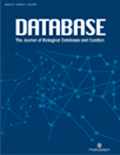
Database-The Journal of Biological Databases and Curation
Advancing the Frontiers of Biological Data ManagementDatabase - The Journal of Biological Databases and Curation, published by Oxford University Press, stands at the forefront of the rapidly evolving fields of biological data management and curation. Since its inception in 2009, this open access journal has become a pivotal resource for researchers and professionals eager to explore the intricate world of biological databases. With an impressive impact factor, it ranks in the Q1 quartile across significant disciplines such as Agricultural and Biological Sciences, Biochemistry, Genetics and Molecular Biology, Information Systems, and Medicine as of 2023. This prestigious standing reflects its commitment to high-quality research and innovation. The journal not only provides a platform for original research articles, reviews, and case studies but also aims to facilitate discussion on best practices in database design and curation. By bridging the gap between data generation and utilization, it plays an essential role in enhancing the accessibility and usability of biological data, making it indispensable for scholars and students who are navigating these complex domains.
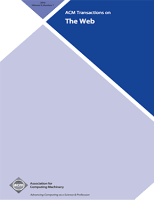
ACM Transactions on the Web
Transforming Ideas into Web SolutionsACM Transactions on the Web is a highly regarded journal published by the Association for Computing Machinery (ACM), focusing on the vast and evolving field of web technologies and their applications. With an impact factor that places it in the Q2 quartile of the Computer Networks and Communications category for 2023, this journal ranks #154 out of 395 in its discipline, showcasing its significance in advancing research and knowledge in the domain. Since its inception in 2007 and continuing through 2024, the journal has been dedicated to publishing original research that contributes to all aspects of web-based systems, applications, and services. ACM Transactions on the Web provides an essential platform for scientists, engineers, and practitioners engaged in web research, offering insights into cutting-edge methodologies and emerging technologies. Readers will appreciate the depth and diversity of articles, which encompass both theoretical and applied research, as well as reviews and case studies. The journal's commitment to quality and rigor makes it a valuable resource for anyone invested in the future of web technologies.

International Journal of Semantic Computing
Elevating Research Standards in Semantic ComputingThe International Journal of Semantic Computing is a premier scholarly publication focused on the intersection of artificial intelligence, computer networks, and linguistics, published by World Scientific Publishing Co PTE Ltd. Since its inception in 2007, this journal has strived to advance the field of semantic computing by promoting innovative research and interdisciplinary collaboration among professionals and academics. With a diverse scope that spans across various categories including Artificial Intelligence, Information Systems, and Linguistics, it boasts commendable rankings, particularly in the fields of Linguistics (77th Percentile) and Linguistics and Language (Rank #259/1167). The journal caters to a broad audience by offering critical insights and cutting-edge studies, thereby contributing significantly to knowledge enhancement in semantic technologies and computational linguistics. Although it does not offer open access options, its rigorous peer-review process ensures the publication of high-quality research that is invaluable for both researchers and students seeking to deepen their understanding in these rapidly evolving areas.

Data Intelligence
Exploring Innovative Solutions in AI and Information SystemsData Intelligence, published by MIT PRESS, is an influential open-access journal dedicated to advancing knowledge within the intersecting fields of Artificial Intelligence, Computer Science Applications, and Information Systems. Since its inception in 2019, it has rapidly established itself as a leading academic platform, achieving impressive rankings—including Q2 in its principal categories for 2023—demonstrating its impact and relevance in these dynamic fields. With an E-ISSN of 2641-435X, Data Intelligence aims to bridge theoretical research and practical applications, providing a venue for scholars and practitioners to disseminate innovative research and ideas. The journal's commitment to open access ensures that cutting-edge research is accessible to a broad audience, fostering collaboration and knowledge sharing among the global community of researchers, professionals, and students. Located in Cambridge, MA, Data Intelligence continues to pave the way for transformative insights in the realm of data-driven technologies through its rigorous peer-reviewed content and a wide array of interdisciplinary perspectives.
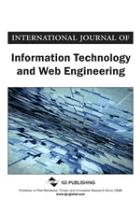
International Journal of Information Technology and Web Engineering
Fostering Collaboration in the Digital EraInternational Journal of Information Technology and Web Engineering, published by IGI GLOBAL, is a pivotal platform for the dissemination of cutting-edge research in the fields of information technology and web engineering. With its ISSN 1554-1045 and E-ISSN 1554-1053, this journal has been effectively contributing to the academic landscape since its inception in 2006, aiming to bridge theoretical frameworks and practical applications in an increasingly digital world. As a recognized Q3 journal in the realm of Computer Science (miscellaneous), it ranks 122 out of 232 in Scopus' classification, positioning it amidst the active discussions and developments within the IT and web engineering communities. The journal not only serves as an invaluable resource for researchers and educators but also encourages students and practitioners to explore innovative methodologies and technologies that shape the future of the digital landscape. Although it is not currently an open-access journal, its contributions are indispensable for advancing knowledge and fostering collaboration within the global research community.
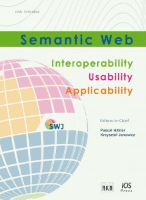
Semantic Web
Advancing the Future of Semantic TechnologiesSemantic Web is a leading scholarly journal dedicated to the advancement of research in the area of semantic web technologies and their applications. Published by IOS PRESS, the journal has established itself as a vital resource for scholars and practitioners since its inception in 2010, with a continued focus on fostering interdisciplinary collaboration through its publication of pioneering research in Computer Networks and Communications, Computer Science Applications, and Information Systems. The journal currently holds a prestigious Q2 ranking across these categories and is indexed in Scopus, reflecting its strong academic impact with rankings in the top 20% of its field. Although the journal operates under a subscription model, it remains committed to disseminating high-quality research that addresses contemporary issues in the semantic web domain. As the field continues to evolve, Semantic Web seeks to facilitate innovation, collaboration, and the development of standards, making it an essential outlet for researchers, professionals, and students keen on exploring the transformative potential of semantic technologies.